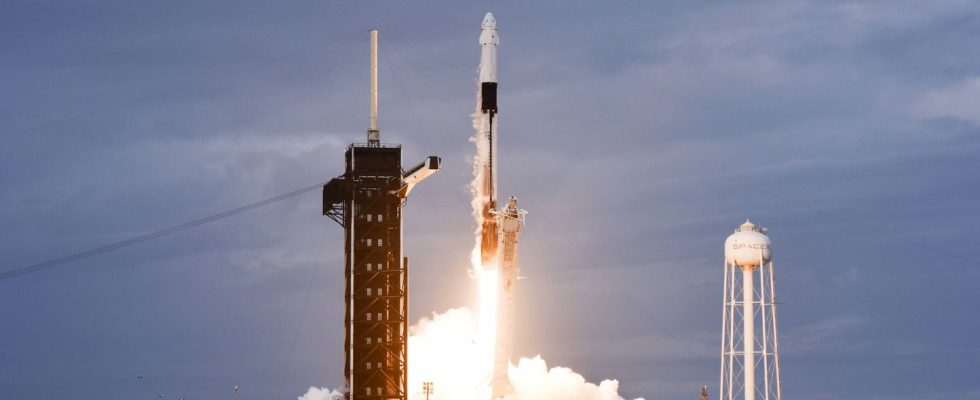Between the renewed interest in the Moon driven by the Artemis missions, Russian, Chinese or private space station projects and the development of space tourism, the space race is well and truly relaunched. But this time, it is not just a matter of national agencies.
Since the beginning of the 2000s, new players, financed by private funds, have emerged, forming the “new space”. “They have economic models and methods that are different from what was done before,” explains Paul Wohrer, researcher specializing in space issues at the French Institute of International Relations (Ifri). Having become essential for space agencies, these companies are trying to position themselves in the very dynamic space market by developing their flagship “products”. SpaceX, Blue Origin, Axiom Space… 20 minutes takes an overview of the players in this sector to follow.
SpaceX
Founded in 2002 by billionaire Elon Musk, SpaceX is “the largest space company in the world, according to Paul Wohrer. They have launched more rockets in the fourteen years since 2010 than Europe has launched Ariane rockets since the program began in 1979. The company has, at least in the short term, a virtual monopoly on launches. commercial satellites. Currently, more than half of the satellites orbiting Earth belong to SpaceX.” Elon Musk’s company launched its emblematic rocket, the Falcon 9, 96 times in 2023, mainly for its constellation of Starlink Internet access satellites, SpaceX’s flagship project. Its launcher, topped with the capsule Crew Dragontakes American and foreign astronauts, notably European, Japanese and Russian, to the International Space Station (ISS).
SpaceX has thus made itself “completely indispensable to many space players, notably NASA and the US Air Force,” explains Paul Wohrer. The company was, for example, chosen by NASA to develop the lander for the Artemis III and IV manned missions, which will be a derivative of its rocket. Starshipstill in the development and testing phase.
If Elon Musk’s company is so essential, it is because it “masters certain technologies that many players do not master,” confides our expert. SpaceX, “manufactures a large part of its products, from launchers to satellites”, has notably succeeded in developing reusable launchers, which return to land on the launch pad or on a barge at sea.
Blue Origin
Blue Origin, created in 2000 by Jeff Bezos, is trying to position itself in the same areas as SpaceX. The company is notably developing the Blue Moon lander and won a NASA contract for Artemis V. “In reality, for the moment, SpaceX and Blue Origin are not quite at the same level,” adds Paul Wohrer. Blue Origin, despite some technological successes, has had much slower development than one might have expected. At present, they do not appear to be a viable competitor to SpaceX. »
Blue Origin is also positioning itself in the space tourism niche thanks to its rocket New Shepard, whose launcher is reusable. Since its first manned flight on July 20, 2021, it has sent 31 people into space, for trips lasting a few minutes. “Jeff Bezos’ company does suborbital tourism, that is to say you go up and come down immediately afterwards, where SpaceX offers orbital tourism, where you stay in space for several days,” explains Paul Wohrer. But Blue Origin was weighed down by an accident in 2022, during an unmanned mission, which grounded its rocket for almost a year. The Amazon boss’s company nevertheless turns out to be “a player that is gaining importance, according to the researcher. They are very well funded and have experts in-house, so their difficulties don’t mean they won’t be successful.”
Virgin Galactic
Virgin Galactic, which offers suborbital tourist flights aboard its VSS Unity, is another new space actor who is getting a lot of attention. Founded by the former boss of Virgin, Richard Branson, in 2004, the start-up “stood out with a fairly large number of tourist flights”, according to Paul Wohrer. Since its first commercial flight on June 29, 2023, it has already sent six groups of people into space.
But these successes are not enough to allow Virgin Galactic to be truly competitive, for the space specialist: “their satellite launch operations were based on a launcher fired from an airplane. This aspect of the business that they wanted to develop didn’t really work out. So they are still very far behind, it is difficult to consider them as viable competitors. »
Axiom Space
An actor founded in 2016, Axiom Space “is clearly positioned in the human flight sector, on everything that revolves around life support for astronauts, according to Paul Wohrer. They want to build their own space station and have managed to obtain contracts from NASA for ISS modules.” The company was also chosen to develop astronaut suits for the Artemis missions.
Axiom Space also operates private flights for astronauts to the ISS. In mid-January, it sent astronauts to the International Space Station through SpaceX.
Rocket Lab
Originally from New Zealand and now hosted in California “to be able to access the largest global market, that of the United States”, Rocket Lab is a real “quite unexpected success story”, describes Paul Wohrer. Its launcher Electrondeveloped to send light to medium payloads into low orbit, “is a one-person project [Peter Beck], which succeeded in manufacturing a very innovative rocket: many subsystems work with electric batteries, which had never been done before. They print in 3D, they make their launcher with carbon fibers,” explains the specialist.
Rocket Lab quickly stood out, notably thanks to its reliability. On January 27, the company made its 43rd flight, a figure “very important compared to other small launchers,” notes Paul Wohrer. They managed to create something that works, and that’s what counts in space.” Building on its success, Rocket Lab is developing a larger rocket, the Neutron. “They are gaining momentum, so it’s really a player to watch,” concludes the researcher.

